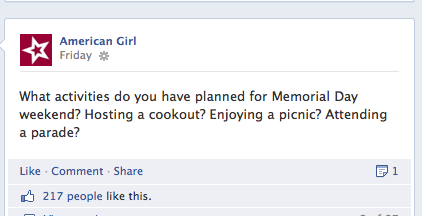I was perhaps seven years old when I first read the first few books in the American Girl ‘Molly’ series, even though I didn’t actually receive the coveted doll until the Christmas I was ten.
It’s hard to say what made me love Molly more than the other American Girl characters then available: Kirsten, the Swedish pioneer; Samantha, the orphan being raised by her wealthy grandmother at the turn of the century.
Like my friend Andrea, who also had Molly, I supposed I loved her glasses, having had worn glasses every waking minute since the start of the third grade. I loved the little silver locket with the picture of her father, an Army doctor, in it.
And I suppose being raised by a history buff who’s especially knowledgeable on the second world war helped, too, as did the fact that my grandparents were all roughly Molly’s age in her time. I loved the things that Molly did with her friends to help out ‘on the home front’; things like knitting blankets for soldiers, collecting scrap metal, and growing ‘victory gardens’ so as to conserve resources for munitions. The books are filled with what philosopher Albert Borgman calls “focal things”; things that
“ha[ve] a commanding presence, engages your body and mind and engages you with others.”
It was this, and the sense that Molly, as a girl only about my age, was able to participate in something so much larger than herself, that captivated my imagination. I loved her stories. I loved her. Truth be told, she–and all her clothing and accessories–remain in what eBay sellers might describe as ‘mint’ condition in my parents’ house to this day, and over the years, I have taken her out to dress her, re-braid her hair, unpack and repack her schoolbag, and page through the tiny replica of a 1940s Nancy Drew novel that fits nicely inside the nightstand next to her bed.
You don’t have to hunt around very long to figure out that ‘pacifist’ would be a fair label to put to me, except that I greatly prefer the notion that theologian Walter Wink calls the ‘third way,’ the way that Jesus embodied, of resisting evil but without force. And so while I have no problem with patriotism–and even consider myself fairly patriotic, in that I love my country–my country’s involvement in war, torture, unjust incarceration, the death penalty, and other things troubles me deeply.
However, I’m also troubled that sometimes those who share my so-called ‘progressive’ (but really, ancient) values on nonviolence sometimes seem to resent patriotism, or feel that honoring the sacrifices made by soldiers and their families undercuts pacifist commitments. We can certainly argue the when, how, why and whether about war, and the possibility of just war, and so on. We can discuss what might be the various merits of a universal draft (with a conscientious objector option for civil service) as against a volunteer army. But for all that, I was unreasonably depressed (though not really surprised) to see the American Girl company’s Facebook status the other day:

What I want to say today is really quite simple. Whatever your convictions on war and peace, today is not the ‘unofficial start of the summer season.’ It is not Barbeque Day or Picnic Day. From Beverly Cleary’s lovely book, Emily’s Runaway Imagination, which I read about the same time I first read the ‘Molly’ books, I learned that today was not always known as ‘Memorial Day’; it was, in fact, Decoration Day, the day on which people would, appropriately enough, given the weather in the US at this time of year, drive out to the graves of loved ones and decorate them. Clear away rotting leaves and make room the crocuses to bloom. Lay a wreath. Say a prayer.
When I was still small enough to play with my Molly doll in public without anyone thinking me strange, I was also a Girl Scout. I loved the focal things we Girl Scouts did; I loved the badges and the uniforms. And I loved marching on Memorial Day down to the docks where a bugler would play ‘Taps’ and we would throw wreaths into the water, one for each branch of service. It was solemn. It was sad. It was beautiful. I believe we then marched back to the fire house for hot dogs and baked beans.
In these hugely divided times, where patriotism is seen as partisan and where a critical stance toward some policy or other is decried as ‘unAmerican’ (what strikes me as truly unAmerican is declaring that a different opinion is unAmerican), it is easy enough to turn Memorial Day into Cookout Day, or Picnic Day. Don’t get me wrong, I love barbeques way too much and long for them when I’m living overseas (as I am now), but Memorial Day–Decoration Day–is about more than just another day off from work. It is about remembering and honoring the lives lost to war (and, I think, remembering the lives lost in nonviolent struggle and by the innocent victims of war) it is–or should be–about clearing the deadness of winter away so that the hopeful blooming of spring can be unsprung. A day to remember that, in the Christian story, death and war and pain do not get the final say.
That should not be not partisan, or even political in anyway. It should–or at least, could–remind us that all flesh is like grass. That flowers bloom and flowers fade and flowers bloom again, and, hope against hope, we who are given the gift of one more day; one more chance to take in a picnic or a barbeque or a parade can remember that not everyone has received that gift.
Remember, then, and then feast.
